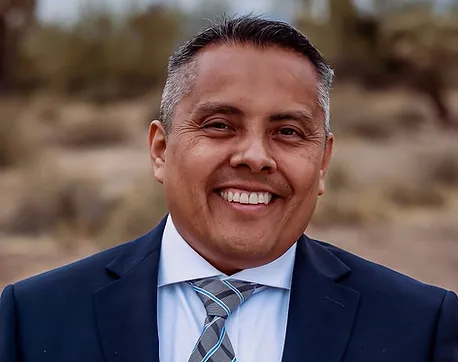
- Details
- By Darren Thompson
MESA, Ariz. — After Mark Pooley retired from law enforcement due to a rare blood cancer in 2020, he continued investigative work by launching a nonprofit to help find missing and murdered Indigenous people (MMIP).
Pooley is Navajo and Hopi with a passion for helping Native people. A former tribal prosecutor and longtime sergeant for the City of Tempe Police Department, he founded Mesa, Ariz.-based nonprofit Native Search Solutions in order to leverage new investigative tools and technology in helping resolve active and cold cases related to MMIP. Services to assist in finding missing people are provided free of cost.
As part of his efforts, he also collaborated with the Native American Fathers and Families Association, a 501(c)3 nonprofit that he founded, and privately held Biometrica Systems Inc., a Las Vegas-based software and data company focused on public safety. Together, they launched MMIP Fusion Center, a brick-and-mortar space where anti-sex-trafficking groups, families, law enforcement agencies, and media can gather and collaborate.
“My main vision is to find as many resources with other non-profits, technologies, and law enforcement agencies to provide resources for our Native people,” Pooley told Native News Online.
While there is no comprehensive data on the number of MMIP in the United States, the FBI’s National Crime Information Center reported 5,203 missing Indigenous girls and women in 2021. According to the CDC, murder is the third-leading cause of death for Indigenous women in the United States. With Native people going missing or murdered at a rate 2.5 times their share of the U.S. population, the outsized number of MMIP has been declared an epidemic by tribal leaders, government officials and law-enforcement agencies.
Federal departments and state governments have taken action in recent years to bridge the gaps in jurisdiction and resources that leave many of these cases unsolved. Most notably, Interior Secretary Deb Haaland created the Missing and Murdered Unit to allocate federal resources to analyzing and solving MMIP cases.
Government resources are critically important to solving the MMIP crisis, but at an investigative level, human resources and technology are among the most critical assets to missing people investigations, Pooley said.
“An investigation needs human resources, or personnel, to conduct an investigation, and technology such as a database,” said Pooley. “If you don’t have one of these, or both of them, you’re behind in an investigation.”
Tribal law-enforcement agencies — which are funded by the federal government — often lack these resources.
The Oglala Sioux Tribe and the Rosebud Sioux Tribe have filed lawsuits against the U.S. Department of Interior for a severe shortage in funding for law enforcement on their reservations in South Dakota.
How It Works
Pooley says there are five main reasons people go missing: drug and alcohol addiction, violence, endangered runaways, human trafficking, and mental health crises.
His process at Native Search Solutions is straightforward: When a person suspects someone is missing, Pooley can be contacted through the Native Search Solutions website. From there, he meets or speaks with the person who made initial contact to get more information and establish mutual understanding.
Before an investigation begins, each person must sign a consent form giving Pooley permission to search for their loved one. Families then share photographs with Pooley, and he taps into Biometrica’s database, which has more than 16 million records sourced from law-enforcement organizations.
“Sometimes, people are arrested for crimes of survival such as shoplifting, and Biometrica pulls a public record booking photos from an arrest and makes matching suggestions to photos families share with me,” Pooley said. “Facial recognition compares photographs families share with me to 16 million others.”
Since 2020, Native Search Solutions has assisted 57 families and has found two people with Biometrica’s database and 14 people with the help of families, according to Pooley.
“We as Native Americans are a minority of a minority, and we basically don’t exist to the dominant society,” Pooley said. “We, as Native people, need to look for our own people. If we’re going to think that someone is looking for us, they are very likely not.”
Native Search Solutions services are provided to families free of cost, and while the organization’s primary focus is on Native Americans, they will assist any family looking for a missing relative. People in Canada and Italy have reached out to the nonprofit in the last year.
“One day, the non-Native world will come to us and ask how we found our people,” Pooley said. “If they’re missing, we’ll try to find them.”
More Stories Like This
Native News Weekly (August 25, 2024): D.C. BriefsNative News Weekly (February 22, 2026): D.C. Briefs
NCAI Releases Sttatement on the Passing of Rev. Jesse Jackson
Colusa Indian Energy Participates in Port of Quincy Town Hall on Columbia Basin Power Project
Q&A: Jingle Dress Dancer Answered Call to Ceremony in Face of ICE Violence
Help us defend tribal sovereignty.
At Native News Online, our mission is rooted in telling the stories that strengthen sovereignty and uplift Indigenous voices — not just at year’s end, but every single day.
Because of your generosity last year, we were able to keep our reporters on the ground in tribal communities, at national gatherings and in the halls of Congress — covering the issues that matter most to Indian Country: sovereignty, culture, education, health and economic opportunity.
That support sustained us through a tough year in 2025. Now, as we look to the year ahead, we need your help right now to ensure warrior journalism remains strong — reporting that defends tribal sovereignty, amplifies Native truth, and holds power accountable.
 The stakes couldn't be higher. Your support keeps Native voices heard, Native stories told and Native sovereignty defended.
The stakes couldn't be higher. Your support keeps Native voices heard, Native stories told and Native sovereignty defended.
Stand with Warrior Journalism today.
Levi Rickert (Potawatomi), Editor & Publisher
